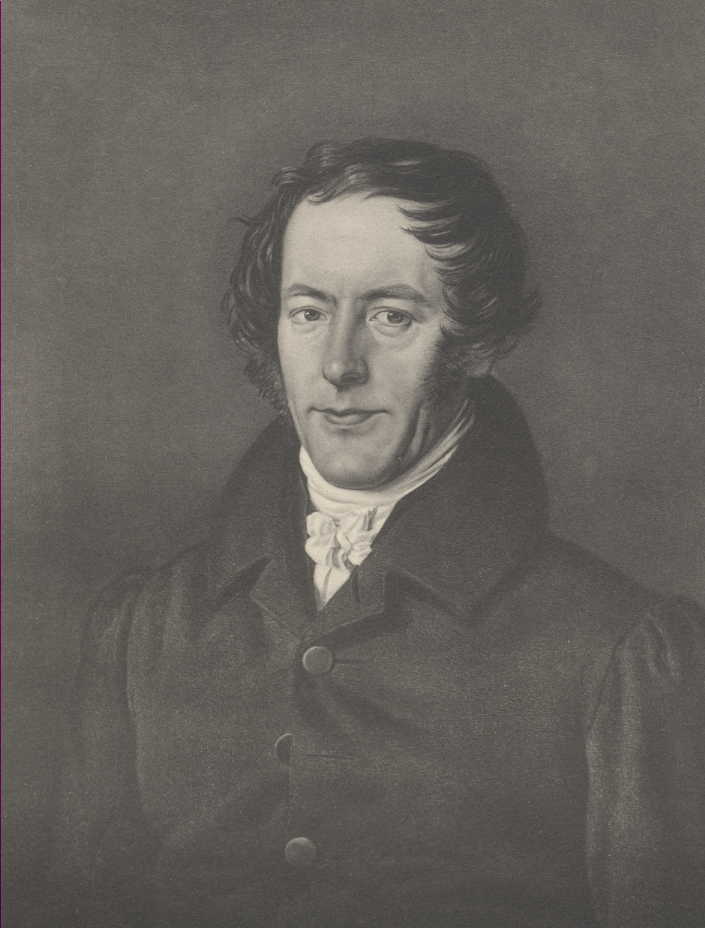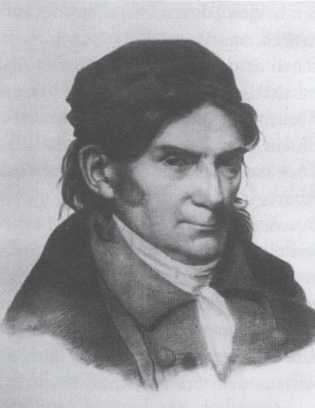|
Karl Schildener
Karl Schildener (26 August 1777 – 28 December 1843) was a German lawyer, legal historian and university lecturer. Life and achievements Schildener was born on 26 August 1777 in Greifswald in what was then Swedish Pomerania. His father was the council pharmacist Johann Karl Schildener (1739-1803), his mother Christina Liboria (1752-1824) a daughter of Balzer Peter Vahl, mayor of Greifswald from 1788 to 1792. Already in 1792 he was enrolled as a student of law at the University of Greifswald, from 1796 he studied at the University of Jena. There he received his doctorate in law in 1798. In 1800 he began studying Swedish law at Uppsala University. In 1802 he was appointed adjunct professor at the University of Greifswald, as teacher of Swedish Law. In 1806 Schildener was appointed to a Swedish commission to translate Swedish legal texts into German so that they could be adopted for Swedish Pomerania. The commission, in which Schildener collaborated with Ernst Moritz Arndt, fir ... [...More Info...] [...Related Items...] OR: [Wikipedia] [Google] [Baidu] |
Johann Christoph Muhrbeck
Johann Christoph Muhrbeck (7 January 1733 – 15 January 1805) was a Swedish Pomeranian philosopher. Early life and education Born in Lund, the son of the theologian Lorenz Murbeck, superintendent in Karlskrona, Muhrbeck was first taught by a tutor and then attended school in Karlskrona. He later studied at the universities of Lund and Greifswald. After his return to Sweden he became a teacher at the cadet institute in Karlskrona. Career In 1760 he was adjunct professor at the Faculty of Philosophy of Greifswald University and held lectures in philosophy and mathematics in this function. In 1767 he was appointed full professor of practical philosophy. After Peter Ahlwardt's death (1792), he also took over the theoretical philosophy. In the years 1778, 1793 and 1803 he was rector of the university. Muhrbeck, who published numerous philosophical writings, was a staunch supporter of Christian Wolff and a staunch opponent of Immanuel Kant. His son Friedrich Philipp Albert ... [...More Info...] [...Related Items...] OR: [Wikipedia] [Google] [Baidu] |
1777 Births
Events January–March * January 2 – American Revolutionary War – Battle of the Assunpink Creek: American general George Washington's army repulses a British attack by Lieutenant General Charles Cornwallis, in a second battle at Trenton, New Jersey. * January 3 – American Revolutionary War – Battle of Princeton: American general George Washington's army defeats British troops. * January 13 – Mission Santa Clara de Asís is founded in what becomes Santa Clara, California. * January 15 – Vermont declares its independence from New York, becoming the Vermont Republic, an independent country, a status it retains until it joins the United States as the 14th state in 1791. * January 21 – The Continental Congress approves a resolution "that an unauthentic copy, with names of the signers of the Declaration of independence, be sent to each of the United States. *February 5 – Under the 1st Constitution of Georgia, 8 counties ar ... [...More Info...] [...Related Items...] OR: [Wikipedia] [Google] [Baidu] |
Legal Historians
Law is a set of rules that are created and are law enforcement, enforceable by social or governmental institutions to regulate behavior,Robertson, ''Crimes against humanity'', 90. with its precise definition a matter of longstanding debate. It has been variously described as a Social science#Law, science and as the art of justice. State-enforced laws can be made by a group legislature or by a single legislator, resulting in statutes; by the executive through decrees and regulations; or established by judges through precedent, usually in common law jurisdictions. Private individuals may create legally binding contracts, including arbitration agreements that adopt Alternative dispute resolution, alternative ways of resolving disputes to standard court litigation. The creation of laws themselves may be influenced by a constitution, written or tacit, and the rights encoded therein. The law shapes politics, economics, history and society in various ways and serves as a mediator of ... [...More Info...] [...Related Items...] OR: [Wikipedia] [Google] [Baidu] |
19th-century Jurists
The 19th (nineteenth) century began on 1 January 1801 ( MDCCCI), and ended on 31 December 1900 ( MCM). The 19th century was the ninth century of the 2nd millennium. The 19th century was characterized by vast social upheaval. Slavery was abolished in much of Europe and the Americas. The First Industrial Revolution, though it began in the late 18th century, expanding beyond its British homeland for the first time during this century, particularly remaking the economies and societies of the Low Countries, the Rhineland, Northern Italy, and the Northeastern United States. A few decades later, the Second Industrial Revolution led to ever more massive urbanization and much higher levels of productivity, profit, and prosperity, a pattern that continued into the 20th century. The Islamic gunpowder empires fell into decline and European imperialism brought much of South Asia, Southeast Asia, and almost all of Africa under colonial rule. It was also marked by the collapse of the large S ... [...More Info...] [...Related Items...] OR: [Wikipedia] [Google] [Baidu] |
Academic Staff Of The University Of Greifswald
An academy (Attic Greek: Ἀκαδήμεια; Koine Greek Ἀκαδημία) is an institution of secondary or tertiary higher learning (and generally also research or honorary membership). The name traces back to Plato's school of philosophy, founded approximately 385 BC at Akademia, a sanctuary of Athena, the goddess of wisdom and skill, north of Athens, Greece. Etymology The word comes from the ''Academy'' in ancient Greece, which derives from the Athenian hero, ''Akademos''. Outside the city walls of Athens, the gymnasium was made famous by Plato as a center of learning. The sacred space, dedicated to the goddess of wisdom, Athena, had formerly been an olive grove, hence the expression "the groves of Academe". In these gardens, the philosopher Plato conversed with followers. Plato developed his sessions into a method of teaching philosophy and in 387 BC, established what is known today as the Old Academy. By extension, ''academia'' has come to mean the accumulation, d ... [...More Info...] [...Related Items...] OR: [Wikipedia] [Google] [Baidu] |
Pommersche Lebensbilder
East Low German (german: ostniederdeutsche Dialekte, ostniederdeutsche Mundarten, Ostniederdeutsch; nds, Oostplattdütsch) is a group of Low German dialects spoken in north-eastern Germany as well as by minorities in northern Poland. Together with West Low German dialects, it forms a dialect continuum of the Low German language. Before 1945, the dialect was spoken along the entire then-German-settled Baltic Coast from Mecklenburg, through Pomerania, West Prussia into certain villages of the East Prussian Klaipėda Region. East Pomeranian, Central Pomeranian and West Pomeranian should not be confused with the West Slavic Pomeranian language (german: Pomoranisch). Related languages East Low German belongs to the dialect continuum of the continental West Germanic languages. It developed from the older Middle Low German. In the West it fades into West Low German. The distinction is usually made referring to the plural endings of the verbs: East Low German endings are based on ... [...More Info...] [...Related Items...] OR: [Wikipedia] [Google] [Baidu] |
Walter Baumgartner
Walter Baumgartner (1904–1997) was a Swiss film composer.Cowie & Elley p.513 He scored over ninety films, working in his later years with the producer-director Erwin C. Dietrich. His nephew was the cinematographer Peter Baumgartner. He was married to the German actress Helen Vita from 1956 until his death. Selected filmography * '' Palace Hotel'' (1952) * ''The Strangler of the Tower'' (1966) * '' Bed Hostesses'' (1973) * '' Frauengefängnis'' (1975) * '' Love Letters of a Portuguese Nun'' (1977) * ''Ilsa, the Wicked Warden ''Ilsa, the Wicked Warden'' (originally released as ''Greta: Haus Ohne Männer'', and also known as ''Greta, the Mad Butcher'', ''Ilsa: Absolute Power'', and ''Wanda, the Wicked Warden'') is a 1977 sexploitation film directed by Jesús Franco and ...'' (1977) * '' Women in Cellblock 9'' (1977) * '' Sechs Schwedinnen im Pensionat'' (1979) * '' High Test Girls'' (1980) References Bibliography * Peter Cowie & Derek Elley. ''World Filmography: 1967''. ... [...More Info...] [...Related Items...] OR: [Wikipedia] [Google] [Baidu] |
Dirk Alvermann
Dirk Alvermann (born 1965) is a German historian and archivist. Early life and education Born in Berlin, Alvermann is a son of the photographer Dirk Alvermann. From 1988 he studied archive science and history at the Humboldt-Universität zu Berlin and the Sapienza University of Rome. In 1993 he took his master's degree in Berlin. Alvermann was a scholarship holder of the German Historical Institute in Rome in 1994. In 1995, he received his doctorate in Berlin with a dissertation suggested by and supervised by Michael Borgolte on the integration of the Reich and the practice of rule under Kaiser, Otto II, Holy Roman Emperor Career Posts After his doctorate, Alvermann worked for the and the . Since 1998 he has been director of the . Alvermann is member of the Historical Commission for Pomerania and was from 2001 to 2011 as editor of the board member of the . Since 2011 he has been a member of the board of directors of the society Research Alvermann's research focuses on me ... [...More Info...] [...Related Items...] OR: [Wikipedia] [Google] [Baidu] |
Georg Friedrich Schömann
Georg Friedrich Schömann (28 June 1793 – 25 March 1879), was a German classical scholar of Swedish heritage.ADB:Schömann, Georg Friedrich @ 
Background He was born at in . ...[...More Info...] [...Related Items...] OR: [Wikipedia] [Google] [Baidu] |
Erich Gülzow
Erich Gülzow (29 March 1888 – 16 August 1954) was a German local historian, philologist and publisher. He wrote books on the history of Vorpommern and Rügen island. Through his publications on Ernst Moritz Arndt he became known beyond the borders of Pomerania. Life Gülzow was born in Loitz in 1888 as the son of the local teacher and chronicler Christian Gülzow (1856–1934) and his wife Marie. After attending the he pursued German studies, Romance studies and theology at the universities of Freiburg, Grenoble and Greifswald. For his dissertation about Heinrich von dem Türlin, he was honoured with the title of doctor in 1913. After passing the examination for the higher-level teaching qualification in 1914, he moved to Barth. At the secondary school there he was active from 1919 as Studienrat. During this time he turned his attention to the history of Vorpommern and began to publish numerous writings and essays as an author and editor. He initiated the series "Barther ... [...More Info...] [...Related Items...] OR: [Wikipedia] [Google] [Baidu] |
Gotland
Gotland (, ; ''Gutland'' in Gutnish), also historically spelled Gottland or Gothland (), is Sweden's largest island. It is also a province, county, municipality, and diocese. The province includes the islands of Fårö and Gotska Sandön to the north, as well as the Karlsö Islands ( Lilla and Stora) to the west. The population is 61,001, of which about 23,600 live in Visby, the main town. Outside Visby, there are minor settlements and a mainly rural population. The island of Gotland and the other areas of the province of Gotland make up less than one percent of Sweden's total land area. The county formed by the archipelago is the second smallest by area and is the least populated in Sweden. In spite of the small size due to its narrow width, the driving distance between the furthermost points of the populated islands is about . Gotland is a fully integrated part of Sweden with no particular autonomy, unlike several other offshore island groups in Europe. Historically there was ... [...More Info...] [...Related Items...] OR: [Wikipedia] [Google] [Baidu] |





